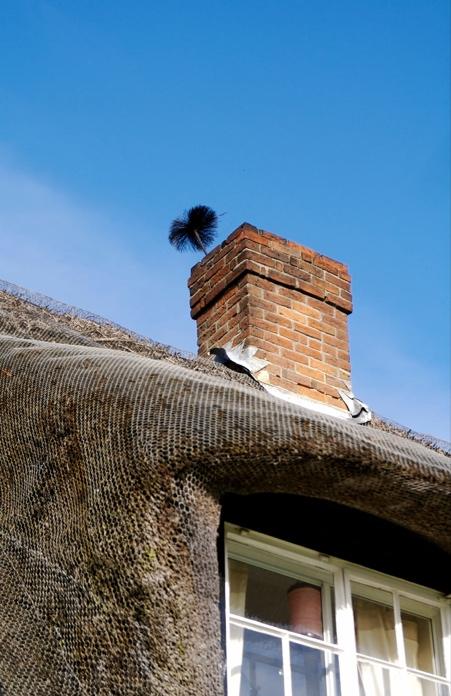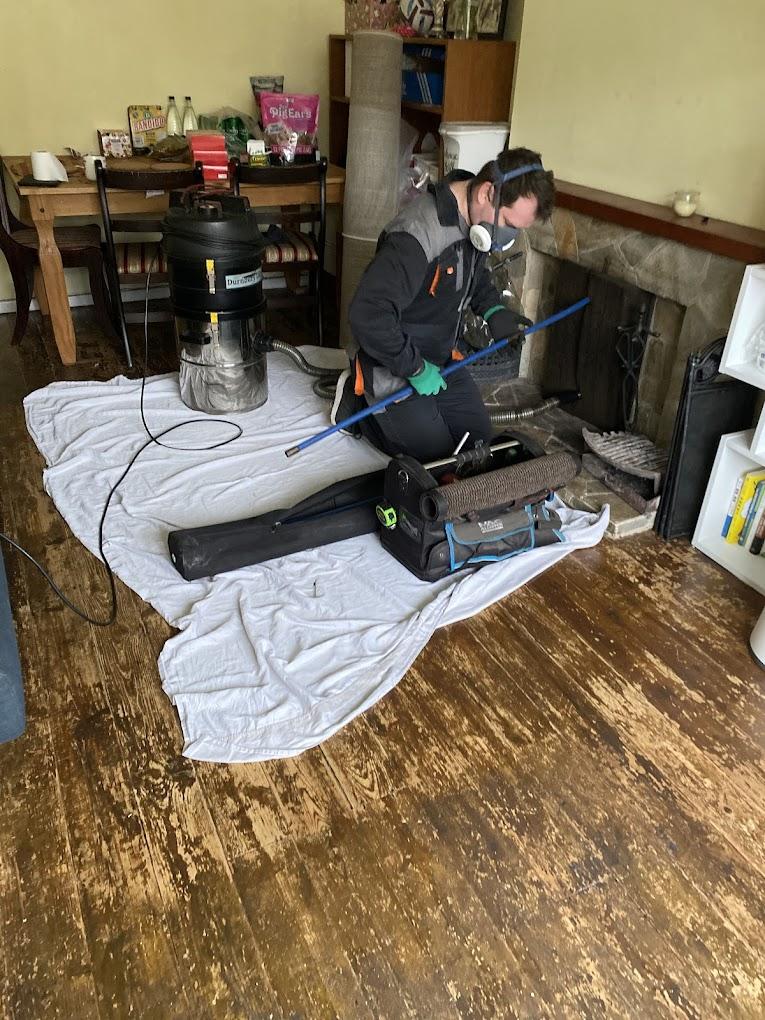As October brings crisp mornings to Cambridge and the surrounding areas, many of us are reaching for the thermostat or preparing to light the first fire of the season. With energy prices remaining a concern for households across Cambridgeshire, Hertfordshire, Suffolk, and Essex, every opportunity to reduce heating costs is worth considering.
You might be surprised to learn that one of the most effective ways to improve your heating efficiency – and reduce those monthly bills – is often overlooked: professional chimney sweeping.
How Dirty Chimneys Cost You Money
When soot, creosote, and debris accumulate in your chimney, they create more than just a fire hazard. These deposits block the efficient flow of combustion gases and reduce your heating system’s performance like trying to breathe through a partially blocked nose.
Your heating appliance works harder for less result when the flue isn’t clean. This is particularly common in older properties across the region, where original fireplaces and complex chimney systems accumulate debris more readily.
How Soot and Creosote Gradually Block Your Flue
Many people imagine chimney blockages as large obstructions like bird nests or fallen bricks. In reality, the most common efficiency problem develops gradually and invisibly over months of use.

Each time you burn wood, soot particles and creosote deposits stick to your flue walls. Layer by layer, these accumulations build up, progressively reducing the internal diameter of your chimney. What starts as a smooth, round flue opening slowly becomes rough and constricted.
This gradual narrowing has a dramatic effect on airflow. Even a relatively thin coating can significantly restrict the passage that combustion gases need to escape efficiently. The rougher surface also creates turbulence, further disrupting the smooth flow essential for proper draft and complete combustion.
Poor Airflow Wastes Fuel
A blocked chimney prevents proper airflow, which is essential for efficient combustion. When air can’t flow freely, your fuel burns incompletely, meaning:
- Less heat is produced from the same amount of fuel
- More waste and unburnt particles are created
- You need more fuel for the same warmth output
Draft Problems Mean Heat Loss
Poor chimney draft forces your heating system to work against restrictions. A blocked flue creates backdrafts that push heated air back into your room before it can heat effectively, whilst also preventing proper removal of combustion gases.
Why Regular Sweeping Pays for Itself

While savings vary depending on your heating system and usage, homeowners typically see noticeable improvements in heating efficiency after professional chimney cleaning.
For wood-burning stoves, a clean chimney can noticeably improve efficiency, with the degree of improvement depending on how blocked the system was initially. Many homeowners report using less fuel to achieve the same warmth after professional cleaning, with the annual cost of sweeping often paying for itself through reduced fuel consumption.
Gas appliances also benefit from clean flues. Optimal airflow ensures complete gas combustion, reducing waste and improving heat output. Even modest efficiency improvements can result in meaningful savings over a full heating season.
Beyond the Immediate: Long-term Financial Benefits
Regular chimney maintenance doesn’t just improve this winter’s bills – it protects your long-term investment.
Preventing Costly Repairs
Regular sweeping removes acidic soot and creosote deposits that can damage your chimney lining over time, extending your chimney’s lifespan and avoiding expensive restoration work that can cost thousands.
Maintaining Appliance Performance
Your heating appliance performs better and lasts longer when it doesn’t work against chimney obstructions, meaning fewer repairs and later replacement costs.
Insurance Compliance
Some insurance policies may require annual chimney maintenance for properties with solid fuel appliances, helping you meet policy requirements and avoid potential claims complications.
When Timing Matters Most
Ideally, chimneys should be swept at the end of the burning season to remove all deposits before they sit in your flue through the warmer months. However, if you’ve missed that window and it’s now October, don’t wait any longer – get your chimney swept as soon as possible before the heavy heating season begins.
October sweeping still offers significant benefits:
- You can address any issues before peak heating season
- Your system will be at improved efficiency from the first cold day
- You’ll benefit from better performance throughout the entire heating season
- Any problems discovered can be resolved before you need your heating most
Different Systems, Same Efficiency Benefits
Wood-Burning Stoves and Fireplaces
Benefit most dramatically from regular sweeping as creosote buildup significantly reduces efficiency.
Gas Appliances
Even gas systems need clean flues, as debris or structural issues reduce efficiency and create safety risks.
Oil Boilers
Produce soot that accumulates over time, requiring clean flues for optimal combustion.
Aga and Rayburn Cookers
These continuously running appliances particularly benefit from clean flues, as efficiency improvements compound over constant operation.
Professional Service: Why Expertise Matters
Basic fireplace cleaning might seem straightforward, but professional chimney sweeping involves much more than removing visible soot. Certified professionals use specialised equipment to clean the entire flue length, identify efficiency-reducing blockages, and spot potential problems before they become expensive repairs.
DIY attempts often miss crucial areas or fail to address underlying issues that continue to impact efficiency.
What to Expect from Professional Service
A comprehensive chimney sweep includes complete flue cleaning, debris removal, visual inspection for damage, airflow testing, and a written report with findings and recommendations. All work meets current UK Building Regulations and safety standards.

Signs Your Chimney Needs Attention
Watch for these efficiency-reducing warning signs:
- Fires that are difficult to start or maintain
- Excessive smoke entering your room
- White staining on the exterior chimney (efflorescence)
- Rust on your damper or fireplace doors
- Animals or birds in the chimney
- Strong odours, especially during damp weather
Any of these symptoms suggest your heating efficiency is already compromised.
Maintaining Your Investment
Once your chimney is professionally cleaned, simple steps help maintain efficiency:
- Use only seasoned, dry wood in wood-burning appliances
- Have gas appliances serviced annually
- Keep chimney tops clear of debris
- Schedule annual professional sweeping
Regular maintenance is particularly important in rural areas where agricultural dust and organic debris can accumulate more quickly in chimney systems.
Frequently Asked Questions
How often should I have my chimney swept to maintain heating efficiency?
For wood-burning appliances used regularly, annual sweeping is essential. Gas appliances should be swept annually as well, though they may not require cleaning as frequently depending on usage.
Will I notice the difference in my heating bills immediately?
Most homeowners notice improved performance right away – fires start easier, rooms heat more quickly, and appliances run more smoothly. The extent of billing improvements depends on your system’s initial condition and becomes more apparent over the full heating season.
Is chimney sweeping worth it for gas appliances?
Absolutely. Gas appliances still produce combustion byproducts, and debris can accumulate in flues. Clean flues ensure optimal efficiency and safety for any fuel type.
Can a dirty chimney affect my central heating system?
If your central heating boiler vents through a chimney or flue, yes. Blocked or restricted flues force your boiler to work harder, reducing efficiency and potentially causing breakdowns.
How do I know if my chimney sweep has improved efficiency?
You’ll typically notice fires start more easily, burn more cleanly, and heat your room more effectively. Your fuel should last longer, and you may notice reduced condensation or odour issues.
What’s the cost difference between regular maintenance and emergency repairs?
Annual chimney sweeping typically costs £60-120, whilst emergency repairs or flue relining can cost thousands. Regular maintenance is always more economical than reactive repairs.
Why Choose Ablewight Chimney Services?
When you choose Ablewight Chimney Services, you’re choosing expertise that makes a difference to your heating bills. As Guild of Master Chimney Sweeps certified professionals and HETAS registered specialists, we don’t just clean your chimney – we optimise your entire heating system’s performance.
We’re Trading Standards Approved and fully insured, giving you complete confidence in our work.
Serving Cambridge, Ely, Newmarket, Royston, Saffron Walden, St Ives, Huntingdon, St Neots, Bishop’s Stortford, and throughout Cambridgeshire, Hertfordshire, Suffolk, and Essex.
Contact Your Local Chimney Experts
Ready to start saving on your heating bills this winter? Contact Ablewight Chimney Services today to schedule your efficiency-boosting chimney sweep.
- Call us on: 01223 627012
- Email: hello@ablewight.co.uk
Don’t let a dirty chimney drain your wallet this heating season. Professional chimney sweeping is an investment that pays for itself in reduced energy costs, improved comfort, and peace of mind.


